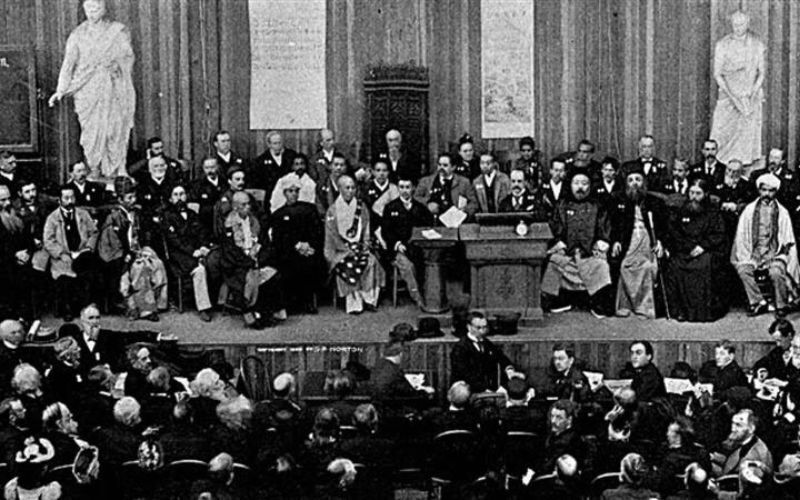The first Parliament of the World's Religions, Chicago, 1883
NOTE: Here the author begins to paraphrase central ideas of several moral thinkers in golden-rule like ways; thus emphasizing a common theme, but without denying wide disagreements on other points.
1886 Friedrich Nietzsche's Beyond Good and Evil despises "Love your neighbor" as suited only for slaves; he praises the will to power and domination. Exploiting others and dominating the weak is part of our nature; compassion frustrates how we're built. (Nietzsche is the philosopher whose ideas most oppose the golden rule; ch. 7 on egoism discusses his objections.)
1893 The first Parliament of the World's Religions, which meets with the Chicago World's Fair, is the first formal, global meeting of the religions of the world. The golden rule is prominent. (Wattles 1996: 91f)
1897 Edward Bellamy's Equality novel describes the utopian 21st-century Republic of the Golden Rule, characterized by love toward all.
1897 - 1904 Samuel "Golden Rule" Jones is mayor of Toledo, Ohio and tries to run the city on golden-rule terms. He had run an oil company on the golden rule. His workers were paid fairly, worked hard, and felt like they shared a common enterprise. When he had trouble with workers, he'd try to understand their situation, imagine himself in their place, and then decide what to do using the golden rule. Jones put the golden rule as: "Do unto others as if you were the others."
1898 Mark Twain, a critic of discrimination, in "Concerning the Jews" writes: "What has become of the golden rule? It exists, it continues to sparkle, and is well taken care of. It is Exhibit A in the Church's assets, and we pull it out every Sunday and give it an airing. It has never intruded into business; and Jewish persecution is not a religious passion, it is a business passion."
1899 American poet Edwin Markham in "The Man With the Hoe" describes a poor man who was crushed by the greed of others. When asked how to deal with this problem, he answers: "I have but one solution - that is the application of the golden rule. We have committed the golden rule to heart; now let us commit it to life." (Jones 1899: 194, 397)
1900? From the Yoruba people in Nigeria comes this golden rule: "One who is going to take a pointed stick to pinch a baby bird should first try it on himself to feel how it hurts."
1900 Wu Ting-Fang, a diplomat from China to the U.S., writes an open letter about how both countries need to be fair and honest in cooperating for mutual economic advantage. He appeals to the golden rule, which he sees as part of his Confucian tradition and as the basis for morality.
1902 J.C. Penney in Kemmerer, Wyoming opens the Golden Rule Store, so called (http://www.jcpenney.net/about-us.aspx) because he founded his company on the idea of treating customers the way he wanted to be treated. In 1950, he published a book called Fifty Years with the Golden Rule.
1903 Jack London's People of the Abyss novel denounces urban poverty: "The golden rule determines that East London is an unfit place to live. Where you would not have your own babe live is not a fit place for the babes of other men. It is a simple thing, this golden rule. What is not good enough for you is not good enough for other men."
1903 George Bernard Shaw quips against the literal golden rule: "Do not do unto others as you would that they should do unto you. Their tastes may not be the same." He adds: "The golden rule is that there are no golden rules."
1905 Helen Thompson's "Ethics in private practice" applies the golden rule to nursing: "Would you be in sympathy with your patient? Would you win her confidence? Then regard this poor sufferer in the light of someone dear to you; put her in that other's stead. Someone has said, 'In ethics, you cannot better the golden rule.' Suppose you render it, 'Do unto others as you would they should do unto yours.' This is your mother; this your sister; this your child."
1906 Edward Westermarck's Origin and Development of the Moral Ideas emphasizes moral diversity but claims that all nations agree on the golden rule.
1907 The School Days song mentions the golden rule in the curriculum: "School days, school days, Dear old golden rule days, Readin' and 'ritin' and 'rithmetic, Taught to the tune of the hickory stick."
1908 John Dewey's Ethics suggests (my paraphrase): Treat others in a way that considers their needs on the same basis as your own.
1911 The first Boy Scout Handbook has this quote from Theodore Roosevelt: "No man is a good citizen unless he so acts as to show that he actually uses the Ten Commandments and translates the golden rule into his life conduct."
1912 Arthur Cadoux's "The implications of the golden rule," besides defending the golden rule from Kant's criticisms, argues that the golden rule seeks the fullness of individual and communal life through harmonizing desires.
1914 Mason leader Joseph Newton ends The Builders by saying: "High above all dogmas that divide, all bigotries that blind, will be written the simple words of the one eternal religion - the Fatherhood of God, the brotherhood of man, the moral law, the golden rule, and the hope of a life everlasting!"
1915 - 18 The Golden Rule Books, based on a U.S. series with the same name, are published to help teach morality to public-school students in Ontario.
1916 C.D. Broad's "False hypotheses in ethics" says: "Suppose Smith were in my circumstances and did the action I propose to do, what should I think of that? If we strongly condemn it, we may be fairly sure that our proposed action is wrong and that our tendency to approve it is due to personal prejudice."


